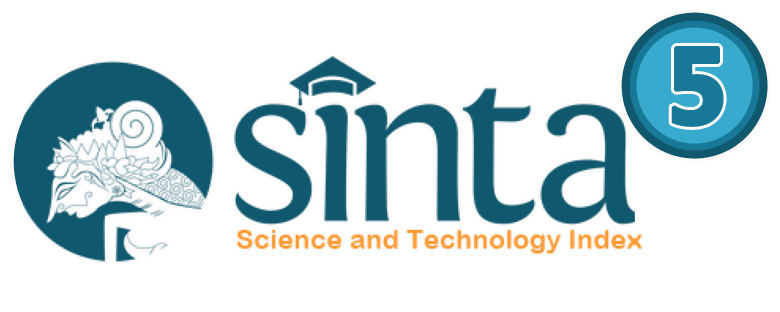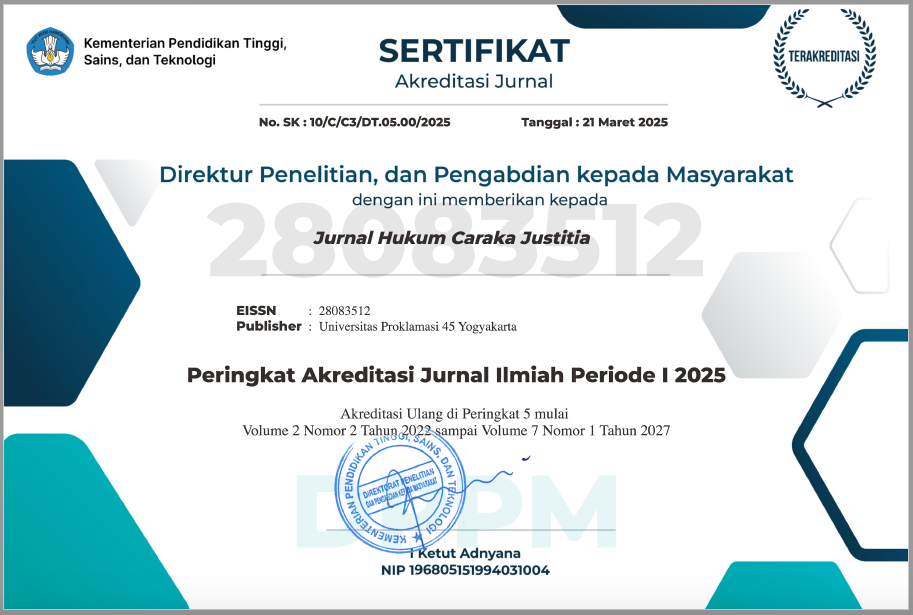Tinjauan Yuridis tentang Penetapan Sebagai Saksi Pelaku yang Bekerja Sama (Justice Collaborator) pada Kasus Tindak Pidana Korupsi di Indonesia
DOI:
https://doi.org/10.30588/jhcj.v4i1.1837Keywords:
Corruption Crime, Justice Collaborator, Determination of Main Perpetrator.Abstract
The purpose of this study is to analyze the laws and regulations governing the legal position and role of justice collaborators, especially regarding the criteria for a person to be designated as a justice collaborator and what is the limit of legal reduction for a justice collaborator. This research is a normative juridical research that is descriptive and analytical, using a legislative approach related to the role and position of justice collaborators in corruption crimes. Data is obtained through document studies and analyzed using qualitative normative methods.
Based on the results of the research, it is known that the determination of a person to be able to serve as a Justice Collaborator has not been expressly regulated in the Criminal Code or laws and regulations governing corruption crimes and there are no rules governing the amount of sentence reduction that can be received by a justice collaborator. The suggestion of this research is the need for a special regulation on justice collaborators which regulates the determination as a cooperating whistleblower (justice collaborator), especially about the definition of “Main Perpetrator” and the need for a clear determination of the amount of sentence reduction that can be given to a justice collaborator as a guideline for law enforcers in determining a person as a justice collaborator in a corruption case.
References
Artikel Jurnal
Harahap, Mar’ie Mahfudz, & Reski Anwar. “Permasalahan Yuridis Penentuan Pelaku Utama Dalam Pemberian Justice Collaborator Sebuah Tindak Pidana Tertentu”. Progresif: Jurnal Hukum XVI, no. 1 (Juni 2022).
Sari , Arifah Wulan, & Muhammad Rustamaji. “Analisis Ketidaksinkronan Putusan Hakim dan Ketentuan Perundang-Undangan Terkait Justice Collaborator Dalam Perkara E-KTP Irman dan Sugiharto”. Jurnal Verstek 8, no. 3 (September – Desember 2020): 273-280. http://download.garuda.kemdikbud.go.id/article.php?article=2592005&val=24433&title=analisis%20ketidaksinkronan%20putusan%20hakim%20dan%20ketentuan%20perundang-undangan%20terkait%20justice%20collaborator%20dalam%20perkara%20e-ktp%20irman%20dan%20sugiharto.
Buku
Alatas, Syed Husein. Sosiologi Korupsi. Jakarta: LP3S, 1983.
Black, Henry Campbell. Black’s Law Dictionary, Edisi VI. Minesota: West Publishing, 1990.
Djaja, Ermansjah. Memberantas Korupsi Bersama KPK (Komisi Pemberantasan Korupsi), Edisi Kedua. Jakarta: Penerbit Sinar Grafika, 2013.
Hamzah, Andi. Pemberantasan Korupsi Melalui Hukum Pidana Nasional dan Internasional. Jakarta: PT Raja Grafindo Persada, 2006.
Sunggono, Bambang. Metode Penelitian Hukum. Jakarta: Rajawali Pers, 2015.
Internet
Santika, Erlina F. “Skor Indeks Persepsi Korupsi Indonesia 2023 Stagnan, Peringkatnya Turun”.
https://databoks.katadata.co.id/datapublish/2024/01/31/skor-indeks-persepsi-korupsi-indonesia-2023-stagnan-peringkatnya-turun (diakses 1 April 2024).
Peraturan Perundang-Undangan
Kitab Undang-Undang Hukum Pidana.
Undang-Undang Nomor 28 Tahun 1999 tentang Penyelenggara Negara yang Bersih dan Bebas Korupsi, Kolusi, dan Nepotisme.
Undang-Undang Nomor 31 Tahun 1999 tentang Pemberantasan Tindak Pidana Korupsi.
Undang-Undang Nomor 20 Tahun 2001 tentang Perubahan Atas Undang-Undang Nomor 31 Tahun 1999 tentang Pemberantasan Tindak Pidana Korupsi.
Undang-Undang Nomor 30 tahun 2002 tentang Komisi Pemberantasan Korupsi.
Undang-Undang Nomor 7 Tahun 2006 tentang Pengesahan United Nations Convention Against Corruption, 2003 (Konvensi Perserikatan Bangsa-Bangsa Anti Korupsi, 2003).
Undang-Undang Nomor 13 Tahun 2006 tentang Perlindungan Saksi dan Korban.
Undang-Undang Nomor 31 Tahun 2014 tentang Perubahan atas Undang-Undang Nomor 13 Tahun 2006 Tentang Perlindungan Saksi dan Korban.
Peraturan Pemerintah Republik Indonesia Nomor 71 Tahun 2000 tentang Tata Cara Pelaksanaan Peran Serta Masyarakat dan Pemberian Penghargaan dalam Pencegahan dan Pemberantasan Tindak Pidana Korupsi.
Peraturan Bersama Menteri Hukum dan Hak Asasi Manusia Republik Indonesia, Jaksa Agung Repubik Indonesia, Kepala Kepolisian Republik Indonesia, Ketua Komisi Pemberantasan Korupsi, Ketua Lembaga Perlindungan Saksi Dan Korban Republik Indonesia Nomor M.HH-11.HM.03.02 tahun 2011, Nomor PER-045/A/JA/12/2011, Nomor 1 tahun 2011, Nomor KEP-B-02/01-55/12/2011, Nomor 4 Tahun 2011 tanggal 14 Desember 2011 tentang Perlindungan Bagi Pelapor, Saksi Pelapor dan Saksi Pelaku yang Bekerja Sama (Whistleblower atau Justice Collaborators).
Surat Edaran Mahkamah Agung Nomor 4 Tahun 2011 tentang Perlakuan Bagi Pelapor Tindak Pidana (Whistle Blower) dan Saksi Pelaku Yang Bekerja Sama (Justice Collaborators).
Downloads
Published
How to Cite
Issue
Section
License
Copyright (c) 2024 Benedictus Renny See

This work is licensed under a Creative Commons Attribution 4.0 International License.
Authors who publish with JHCJ agree to the following terms:
Authors retain copyright and grant the JHCJ right of first publication with the work simultaneously licensed under a Creative Commons Attribution 4.0 International License that allows others to share (copy and redistribute the material in any medium or format) and adapt (remix, transform, and build upon the material) the work for any purpose, even commercially with an acknowledgment of the work's authorship and initial publication in JHCJ.
Authors are able to enter into separate, additional contractual arrangements for the non-exclusive distribution of the journal's published version of the work (e.g., post it to an institutional repository or publish it in a book), with an acknowledgment of its initial publication in JHCJ. Authors are permitted and encouraged to post their work online (e.g., in institutional repositories or on their website) prior to and during the submission process, as it can lead to productive exchanges, as well as earlier and greater citation of published work (See The Effect of Open Access).














